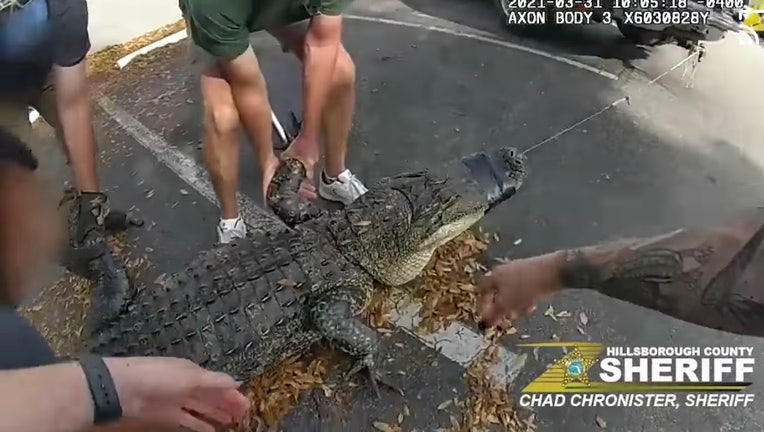Gatorland expert: What to do if you find an alligator under your car

ORLANDO, Fla. - Local alligator experts are cautioning people not to bother alligators if they see one after video of a massive, 10-foot gator found underneath a car went viral.
The Hillsborough County Sheriff’s Office released deputy body camera video of a trapper and deputies wrangling a gator that was found underneath a parked car at a Tampa apartment complex.
Gatorland Director of Media Relations Brandon Fisher said it was an impressive sight to see. "Most times when you hear about an alligator under a vehicle it’s a little guy…. Four, five maybe 6-foot alligator. It’s not a big 10, 11-foot alligator."
RELATED: Body cam shows 'arrest' of 10-foot gator found under car in Florida
Fisher estimated the gator could have weighed between 500-800 pounds. He said alligators typically walk miles to find food, bodies of water and for mating.
"Most times what those guys are trying to do is find a nice shady area to get out of the sun," he said.
Fisher said if you ever find an alligator in a similar situation never feed it, touch it or try to scare it. He said the best option is to keep a safe distance and call Florida Fish and Wildlife Commission’s Nuisance Alligator Hotline at 866-FWC-GATOR (866-392-4286). He said they will send out a contracted licensed trapper to catch the gator.
Fisher said loud noises probably would not scare the gator and he does not recommend trying to scare it off. He also does not recommend trying to move the vehicle because a person risks hurting themselves and the gator. "The alligator could come after you… If you do move the vehicle and that gator decides to take a chomp of your muffler, you don’t want that to happen."
RELATED: Large alligators wrestle in Lakewood Ranch backyard as mating season gets underway
Fisher said expect to see more gators over the next few weeks as courtship and mating season begins.
Gator mating season typically begins in May or June, but their courtship starts in mid-April and means more alligator sightings as the reptiles venture out in search of their mates.
By late June or early July, female gators will lay between 32 to 46 eggs. Incubation periods for alligators take about 60 to 65 days, and baby gators will be born in late August or early September, according to the Florida Fish and Wildlife Conservation Commission.
FWC defined a nuisance alligator as one that is at least 4 feet long and the caller believes it poses a threat to people, pets or property. The FWC website stated, "There are situations when smaller alligators wind up in places that are not acceptable, such as swimming pools, garages, etc., and must be removed. When someone concerned about an alligator in any of these situations calls the Nuisance Alligator Hotline, we will dispatch one of our contracted nuisance alligator trappers to resolve the situation."
Nuisance alligators are killed, not relocated.

